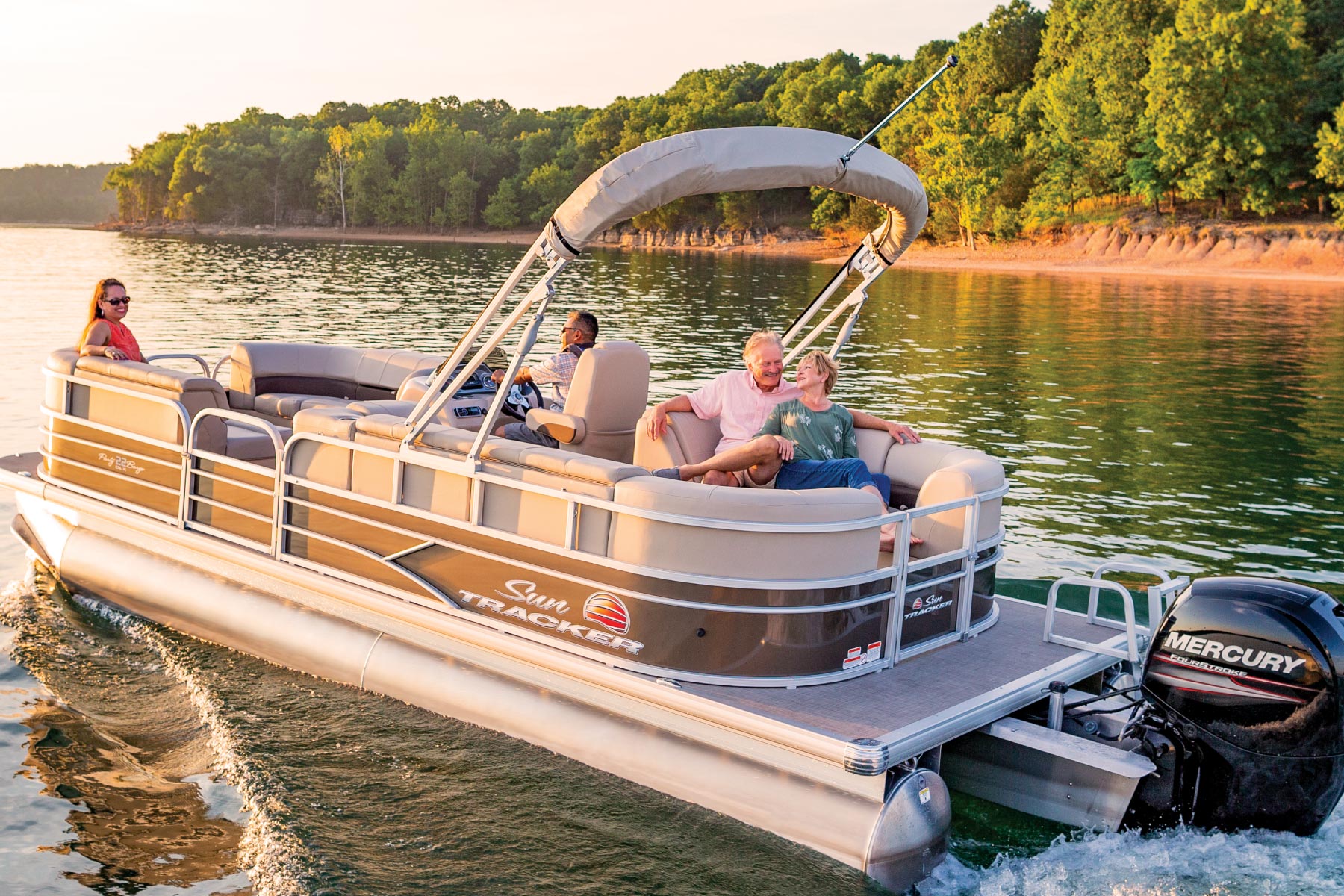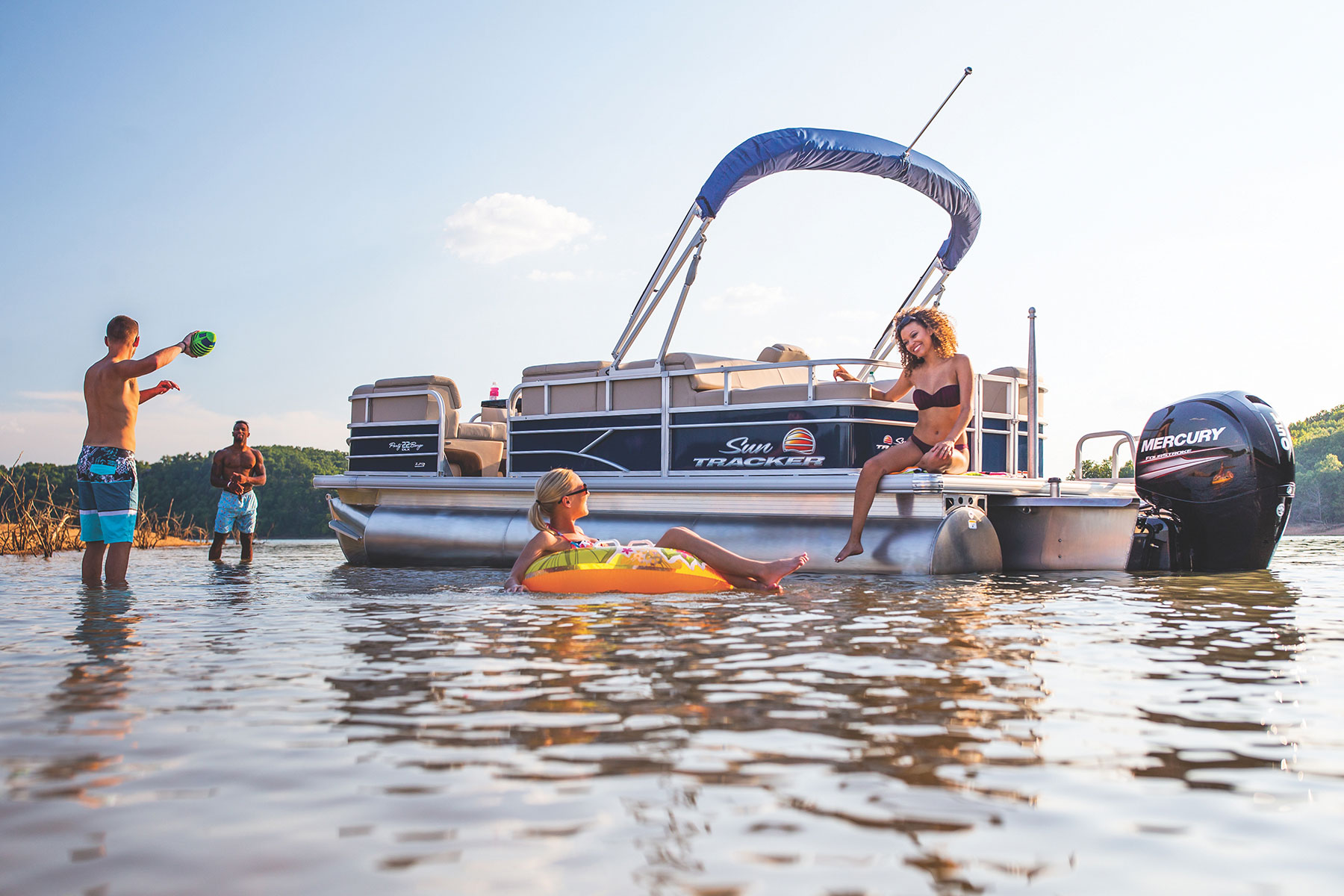Got questions? Here are answers to common questions asked by boaters.
Q. Can I buy a boat package without the motor?
A. All of our boat packages come with a factory-rigged motor to ensure each model is optimally powered and provides the absolute best value. Our packages cannot be purchased without a motor. The only boats that can be purchased without a motor are our non-package TRACKER jon boats.
Q. My livewell quit working. What should I check first?
A. Check for debris in the pump or for a blown fuse on the breaker panel.
Q. How can I determine the maximum recommended horsepower for a particular boat?
A. If you're shopping for a boat, the maximum recommended horsepower rating for each boat can be found on its model details page on the brand website. For owners, the maximum rating can be found on the capacity plate. Owners should NEVER install a motor that exceeds the maximum horsepower rating of a boat. Doing so would greatly compromise the safety and integrity of the boat.
Q. Why do my gauges fog up?
A. Fogging occurs when moisture from the atmosphere condenses inside the instrument case. This should dissipate quickly once the instrument gauge lights are turned on.
Q. Are aluminum boats more affordable to keep up and operate compared to fiberglass boats?
A. Aluminum boats are generally lighter than their fiberglass counterparts and can be operated with lower (and less expensive) horsepower motors. This results in better fuel economy on and off the water. Aluminum does not require the upkeep or maintenance that fiberglass does.
Q. What kind of maintenance will be required for my motor?
A. The service or maintenance you need to regularly perform on your motor varies depending on the type of motor you have and how often and where you use it, among other factors. Please refer to your Mercury or MerCruiser owner's manual for full information. You may also contact Mercury directly at 920.929.5040. Be sure to have your motor serial number ready when you place this call. If you have an older motor (years 1939–1999), contact the Mercury Classic Hotline at 920.929.5200. (Note: A $20 fee per call to the Classic Hotline applies.)
Q. How does the livewell work?
A. There are essentially three types of livewell systems—manual and recirculating. Your boat may incorporate features from one or more of these. Many livewell systems also include a pump-out feature.
Manual — The manual system fills the livewell and aerates the water, continuously pumping fresh water into the well. Components of the manual system include a drain, removable overflow tube, aeration/fill nozzle and livewell pump.
To fill the livewell, set the Livewell Switch to the ON or FILL position. To drain the livewell, remove the overflow tube to allow the water to empty out of the livewell.
Recirculating — The recirculating livewell is different from the manual system in that it is typically a two-pump system. The second pump allows you to recirculate the water that is in the livewell, even while the boat is in operation or being trailered. When using the recirculate mode, keep in mind that since no fresh water is being brought in, the temperature of the water in the livewell can rise quickly and may kill your fish.
Livewell Controls — Depending on the model, your boat may have toggle, rocker, dial or sliding switches for livewell control.
Some livewells have a timer for aerating and adding fresh water to the livewell in a controlled time cycle. Livewells with this feature will have a three-position switch labeled "MAN" and "Auto". Use the manual position to fill the livewell and for aeration while fishing. Use the automatic position to engage the timer so that the pump shuts OFF and turns ON within a factory-set time cycle. Typically, one minute ON and three minutes OFF. The middle position on the switch is for turning the pump OFF.
Q. Are rivets used in construction of your TRACKER boat hulls?
A. For the hull, TRACKER boats only use rivets on the Topper Jon boats. All other aluminum boats are welded.
Q. Why are there fewer seats than capacity for people on some boats?
A. The Maximum Person Capacity is determined by the U.S. Coast Guard using the size of the boat and doesn't necessarily reflect full seating arrangements in each model. Some models offer additional seating on floors or decks.
Q. How do I clean the upholstery on my boat?
A. You can use mild soap with water or a marine vinyl cleaner to clean your boat upholstery. Avoid using bleach or other harsh chemicals.
Q. How many people can I safely have on my boat?
A. There is a capacity plate located near the driver seat which states the maximum capacity for your boat as defined by the U.S. Coast Guard.
Q. What is the stringer system in a hull, and what does it do?
A. The stringer system is a structure inside the hull that serves as the "backbone" of the boat to help provide strength to high-stress areas.
Q. How many life jackets do I need to have on my boat?
A. You need to have one U.S. Coast Guard-approved life jacket for each person onboard, plus a throwable flotation device.
Q. What can I check when my engine/motor won't start?
A. Make sure the emergency stop switch is ON. Check battery condition, cable connections and circuit breakers/fuses. Verify the motor is getting fuel. You may also contact Mercury at 920.929.5040. Please have your motor serial number ready when you place this call. If you have an older motor (years 1939–1999), call the Mercury Classic Hotline at 920.929.5200. (Note: There is a $20 fee per call to the Classic Hotline.) Or, you can visit your nearest Power Pros service center for help.
Q. Can I get an aluminum deck for my pontoon boat?
A. With today's lifetime guaranteed pressure-treated plywoods, you simply don't ever need to worry about your deck failing. Therefore, we do not offer aluminum decks as an option anymore. In addition, wood provides better sound dampening and a more rigid surface without unnecessary added weight.
Q. Can I use my aluminum boat in saltwater?
A. Yes, you can use your aluminum boat in saltwater applications. The proper precautionary measures should be taken when operating the boat in both saltwater or brackish water, however. The boat should be rinsed with fresh water and rubbed with a soft cloth after each use. If docking or mooring your boat in saltwater for an extended time, it is recommended that your hull be protected with an anti-fouling paint or a similar protectant. Be sure to check the sacrificial zinc anode attached to the motor and replace it when it is more than 50% corroded. Galvanic corrosion is accelerated in saltwater, so additional zinc anodes may be necessary for extra protection. Note: We do not recommend taking aluminum boats offshore and out into the ocean, though, due to potential wave sizes and safety issues.
Q. Why are only Mercury brand motors available on your boat packages?
A. Mercury is the industry-leading provider of outboard and sterndrive motors. Because of that, we have partnered exclusively with them to ensure each of our boats is powered optimally for maximum performance and value.
Q. Do I need a special license to operate a boat?
A. Although most states do not require a boating license, several states do. Be sure to check your local, state and regional boat laws to ensure you are adhering to all licensing requirements.


